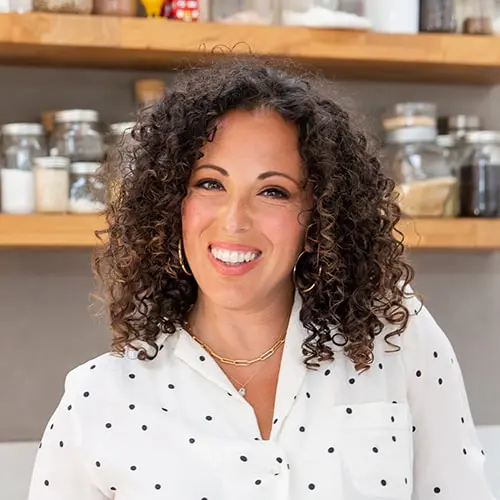Is Toxin Exposure Aging You Faster?
Are you looking in the mirror every day and wondering how you can turn back the clock?
You’re in the prime of your life, but you are noticing wrinkles and fine lines where there used to be none.
You can’t seem to squeeze into your favorite jeans.
You feel an energy dip in the afternoon when you want to be present to your kids.
It seems like your mind has lost its sharp edge.
Your muscles are less toned, even when you double-down on your workouts.
After tackling work and home life, does it feel like you have nothing left over for your own enjoyment?
Unfortunately, you’re not imagining things. It’s real. Your cells are aging. You are aging. But it doesn’t have to be that way. Because you can turn back the clock.
I’m inviting you to get off the aging train. Keep reading to find out one of the most important steps you can take to slow the aging process. You can hold on to that youthful glow -and turn heads- now and well into your golden years.
Look and Feel Younger
Did you know that your biological age can be much younger than your chronological age?
Your chronological age is based on how many birthdays you’ve celebrated. Your biological age is based upon how old your cells think they are and how they feel. By turning back the clock on your biological age, you will no longer be a prisoner to your chronological age.
Here’s an example of young biological age…
I’ve taken up social dancing recently, a type called Casino that is from Cuba. Dance is a huge piece of how I stay younger. Dance brings me joy.
When we’re joyful, our cortisol levels are more balanced, our hormones are more balanced, our body functions better and we have more oxytocin, a love hormone that plays a role in social bonding.
Dancing is good for my health. I’m a better person when dance is part of my regular weekly routine.
A couple of weeks ago when I was out dancing, I saw a woman in her mid- to late 70s. Not only was she the life of the party, she was even getting down on the dance floor with the lead singer of the band! She was the poster child for someone who has a young biological age
I will be doing something right if I’m her age and have her energy and her outlook and her mood! I just looked at her and thought #lifegoals.
The point is: there are a lot of ways to be 75 or 80 years old. She’s found what feeds her soul. She found her place, her happy spot. Her chronological age might be chasing 80, but her biological age was much younger.
So what does dancing have to do with environmental toxins? You see, exposure to toxins is one of the most common things that cause our biological age to skyrocket. Your youthfulness—or your biological age—is an equation. You can slow down aging with things that bring you joy, a healthy diet, nutrients, building muscle mass, and more. You can speed up aging with stress, toxins, poor diet choices, drinking, staying up late, smoking, working out too much, radiation, and more.
Toxin exposure can make you look and feel older. Toxins trigger inflammation, damage DNA, shorten telomeres, and get in the way of healthy mitochondrial function.
The good news? There are ways to measure your toxin exposure and to detox your body. Let’s take a deep dive into how toxins age you faster. You’ll find out what you can do to kick toxins to the curb so you can feel and look more youthful.
Lead and Mercury and BPA, Oh My!
Everywhere you go and everything you do exposes you to toxins. They’re found everywhere from canned food to cash register receipts to some personal care products, children’s jewelry and toys, vinyl flooring, dust, and soil. Toxins lurk in the water you drink, the air you breathe, and the food you eat.
For example, lead—a chemical linked to heart disease and other health problems—is found in many places including:
- Electrical cords including Christmas tree lights
- Houses painted (and toys made) prior to 1978
- Imported candies and food
- Lead-glazed ceramics, china, leaded crystal, and pewter
- Some folk medicines, ayurvedic medicines, and cosmetics
- Some children’s jewelry and toys.
This article isn’t meant to go into detail about each and every toxin. Just know that toxins are out there and we’re exposed to them from the time we’re in the womb.
But don’t let this discourage you because there are ways to decrease your toxic burden. I will discuss more on how to detox later in this article.
A Telomere’s Worst Enemy
One reason why toxins age the body is because of their impact on telomeres. The genetic blueprint of our bodies is encoded on double-stranded DNA molecules called chromosomes. Telomeres are protective caps on the ends of chromosomes that make it possible for cells to divide without scrambling that important DNA information. Telomeres are often compared to those hard sections at the end of shoelaces that stop them from unraveling.
Telomeres grow shorter and shorter each time cells divide. Eventually telomeres get so short that cells can no longer divide, and instead they die.
What does telomere shortening mean for your body? The shorter your telomeres, the greater the chance you’ll feel and look older. Short telomeres are linked to a whole host of age-related problems, whether we’re talking about cancer, immune system and memory problems, inflammation and all the diseases that go with it, or skin wrinkling.
Toxins are basically out to get your telomeres. For example, every time you touch a cash register receipt or eat food out of a plastic container or can that’s not BPA-free, your telomeres will need to duck and cover because they might get a hefty dose of bisphenol-A (BPA). Even low-doses of this toxin speed up telomere shortening.
Likewise, lead exposure damages telomeres. This is an important way in which toxins age you faster.
How Toxins Do Their Dirty Work
Environmental toxins damage the mitochondria, the powerhouses that fuel our cells and give them energy to keep working their best. When toxins hurt the mitochondria, cells are injured and stressed, creating molecules that are pro-inflammatory and speed up aging.
Normally, inflammation benefits the body because it helps the body recognize and fight off infections or address naturally occurring damage to our tissues. This type of inflammation is low-grade and should have a beginning, middle, and end.
We have systems in our body that understand when the inflammation is needed and should resolve it in the same way firefighters strive to put out a wildfire before it gets out of control.
But when toxins damage our mitochondria, the checks and balances that the body usually puts in place to stop inflammation from spiraling out of control stop working.
The result? Inflammation rages out of control and goes on and on, causing a shift in the immune system and leading to more tissue damage, cellular aging, and chronic inflammatory diseases. For example, it can cause the immune system to attack itself, causing autoimmune disease.
Are You Suffering from Inflammaging?
As we grow older or are exposed to damaging substances like toxins, inflammation ramps up in the body like a fire that hasn’t been put out. Damaged mitochondria from toxin exposure create pro-inflammatory molecules, which can speed up aging.
Scientists coined a term for the inflammation that goes into overdrive when we age. It’s known as “inflammaging.” Aging plus inflammation is not pretty. It puts you at greater risk for many diseases that disable the elderly including heart disease, diabetes, and dementia. Out-of-control inflammaging can also cause wrinkles to pop up on your face, and you can say goodbye to your youthful appearance.
There’s another damaging process called oxidative stress, which goes hand in hand with inflammation. Reactive oxygen species (ROS) are the culprits behind oxidative stress. Some oxidative stress is healthy, but too much of it hurts your body. That’s why people take antioxidants—to protect themselves against too much oxidative stress.
Oxidative stress builds up in your body for many reasons, but toxin exposure is one of the most common.
Where Are Toxins Lurking?
Toxins are made by harmful bacteria in the gut and those in the water supply. We also can get exposed to toxins when we eat or drink, especially food that’s not organic or when we drink too much alcohol.
We breathe air and dust that contain toxins (such as mycotoxins from mold), which enter the lungs, travel into the mucous membranes in the sinuses, and drip into the throat. When we swallow, the toxins end up in the gut.
If your cells are exposed to lots of toxins—and heavy metals are some of the worst offenders—production of reactive oxygen species goes into overdrive and damages the mitochondria and weakens your body’s ability to protect you.
If the toxic burden is too high your mitochondria can’t repair themselves, which means the mitochondria can’t make enough ATP, the energy molecule that fuels your cells. The result? Feeling tired and dragging as you perform your daily responsibilities.
How Your Body Protects You Against Toxins
So what happens when you’re exposed to these toxins? Nrf2 to the rescue! The Nrf2 pathway in your body soothes inflammation and boosts your body’s production of antioxidants.
Aging, toxins, and infections weaken the Nrf2 pathway, which is why it’s important to increase levels of this powerful protein. I’ll talk more about a substance that activates the Nrf2 pathway later in this article, so you’ll be armed and ready to defend yourself against rapid aging.
Testing for Toxins
The good news? We can measure our toxin exposures by using a number of blood tests such as:
- Genova ION test to measure levels of the antioxidant glutathione, oxidative stress, and different liver detox pathways
- Testing for mycotoxins, or toxins from mold (Mycotox Panel by Great Plains Laboratory)
- Heavy metals testing (Mercury Tri-Test & Blood Metals Panel Quicksilver Scientific test)
- Environmental toxin burden panels (Great Plains Laboratory ENVIRO-Tox Panel).
How to Detox Your Body from Toxins
You don’t have to put up with a toxic brew of chemicals that harm your health and age you faster. Here are some ways to detox your body or avoid toxin exposure in the first place. These strategies can slow aging and lead to younger looking skin and a healthier body.
- Use an Infrared Sauna. Pull toxins out of your body by sweating them out using an infrared sauna or infrared sauna blanket.
- Dry Brushing. This method is thought to open pores and promotes sweating to release toxins through the skin.
- Install a Good Water Filter. To purify the water supply, use a water filter not only in the kitchen but also in the bathroom so you don’t breathe in (or bathe in) toxins while you shower.
- Eat Organic Food. To reduce your toxin exposure in the first place, eat organic food. Researchers have found that people eating an organic diet have lower levels of pesticides in their urine samples.
- Promote Bile Flow. After the liver detoxifies toxins, the byproduct is removed from the body through bile, which is excreted in the intestines. Make sure you’re pooping daily. If not, try eating more fiber, taking a magnesium supplement, and addressing other root causes of constipation.
- Drink Lots of Water and Liquids. You’ll need to drink enough water or other healthy liquids like herbal tea to keep toxins moving through the kidneys and out through the body.
- Support the Nrf2 Pathway. Sulforaphane, which is found in broccoli, is an Nrf2 activator. It’s a good idea to eat lots of this vegetable to reduce inflammation and oxidative stress and to keep the mitochondria healthy. Just make sure you choose the organic variety in order not to expose yourself to even more toxins. Healthcare practitioners may offer supplements that contain other Nrf2 supportive combinations of herbs and nutrients.
- Keep Your Mitochondria Happy. NAD+ is just one supplement that I use in my clinical practice to support mitochondria health. You can read more about this nifty nutrient here:
- Take a Prebiotic and Probiotic. These can protect your gut against bacterial-produced toxins. I recommend Megaprebiotic and Megaspore.
Other Factors That Can Make You Look and Feel Older Than You Are
Many factors besides environmental toxin exposure can age you faster. These include:
- How you sleep or don’t sleep
- Ongoing infections in the gut or bacteria-related toxins known as endotoxins
- Smoking cigarettes
- Solar radiation
- Eating too many processed and artificial foods
- Not spending enough time in nature
- Being under a lot of stress
- Ongoing psychoemotional challenges (experiencing trauma)
All of those things impact how fast or slow we age, more so than the number of years you have on the planet. They’re the driving force behind whether you’re going to be dancing salsa when you’re in your 80s or too tired to get off the couch.
How to Slow Aging with My Help
Are toxins causing you to age faster? That’s what we will find out if you choose to reach out to me for a free 15-minute troubleshooting call. As a functional medicine provider, I can order the right tests and interpret the results to find out which toxins are damaging your telomeres and mitochondria. Then I’ll develop a treatment plan to detox your body and give you a more youthful appearance, increased energy levels, and a sharp memory—to name just a few healthy aging benefits. Sign up for a call today, so you can feel and look years younger.
At the Reverse-Age Method, we believe in a holistic approach to perimenopause and beyond, that addresses the root causes of your symptoms (like insomnia, hot flashes, night sweats, erratic periods, fatigue, skin aging, weight gain, and brain fog)– to also slow the pace that your cells are aging. Whether it’s improving gut health, optimizing detox function, enhancing mitochondrial function, or building muscle mass, our comprehensive program has got you covered.
If you’re new here, be sure to check out our Blog Page for more insights and tips on how to thrive during perimenopause. Our blog is packed with practical advice, success stories, and the latest research to help you on your journey.
For more updates and community support, follow us on social media:
You May Also Like...
Recipe: Grandma Fleischer’s Chopped Liver
Liver. You either love it or you hate it. Or you're too scared to find out. If you ask someone who grew up in a family…
A Functional Medicine Practitioner-Designed Postpartum Recovery Plan (For Mom & Baby)
It’s hard to believe my baby girl is coming up on 5 months old already! All the mamas out there know… the postpartum…
Whether you’re looking for help with your gut, your hormones, or both, our team of practitioners work together to treat the WHOLE you – guiding you to a healthier mind, body, and spirit day by day.



